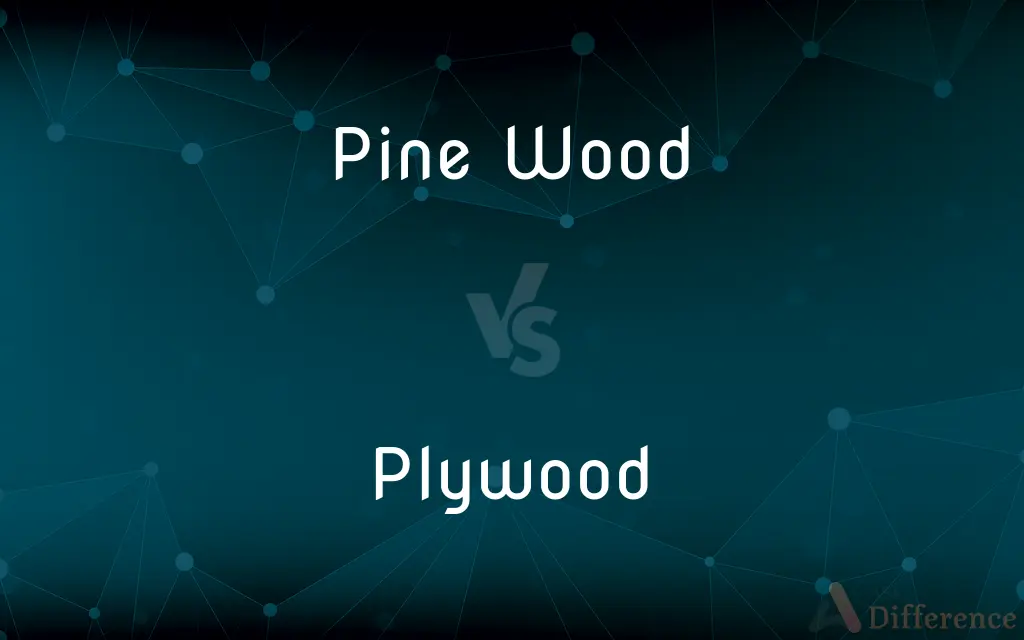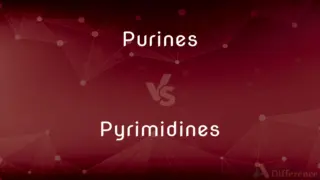Pine Wood vs. Plywood — What's the Difference?
By Tayyaba Rehman & Fiza Rafique — Published on October 11, 2023
Pine Wood is solid wood from pine trees; Plywood is engineered wood made from layers of wood veneer. Both serve various purposes in construction and furniture.

Difference Between Pine Wood and Plywood
Table of Contents
ADVERTISEMENT
Key Differences
Pine Wood, derived directly from pine trees, is a type of softwood that is lightweight and generally has a light, pale yellow color. On the other hand, Plywood is not sourced from a specific tree; instead, it’s an engineered wood product made by gluing together thin layers of wood veneers.
Pine Wood is appreciated for its ease of use in woodworking projects due to its softer nature, whereas Plywood is valued for its stability and resistance to warping because of its cross-layered structure.
The applications of Pine Wood often revolve around furniture, window frames, and interior paneling, utilizing its aesthetic appeal. Conversely, Plywood finds its usage in a wide array of structural, interior, and exterior applications due to its versatile strength and functionality.
When considering cost, Pine Wood can vary significantly in price based on the specific type and quality, while Plywood tends to be more consistently priced, often offering a more economical choice for larger projects.
Environmentally, Pine Wood could be seen as more sustainable if sourced from managed forests; Plywood, while utilizing more processing and adhesives, can also be eco-friendly if made from sustainable wood sources and using low-VOC glues.
ADVERTISEMENT
Comparison Chart
Origin
Comes from pine trees
Engineered from wood veneer layers
Hardness
Generally soft
Varies, generally harder due to layering
Grain Appearance
Visible wood grain
May have less prominent grain
Cost
Can be varied
Typically cost-effective
Typical Use
Furniture, paneling
Structural, exterior, and interior use
Compare with Definitions
Pine Wood
A softwood obtained from pine trees.
The carpenter built a beautiful chair using Pine Wood.
Plywood
Generally cheaper and more readily available than solid hardwood.
To save on costs, they opted for Plywood cabinets.
Pine Wood
Typically less resistant to rot and pests than hardwoods.
The Pine Wood deck required regular treatment to prevent decay.
Plywood
Can be produced in larger and more consistent sizes than solid wood.
The large sheets of Plywood were perfect for the wall sheathing.
Pine Wood
Noted for its light, pale yellow color.
The Pine Wood was chosen for its bright and airy aesthetic.
Plywood
Known for its resistance to cracking, shrinking, and twisting/warping.
Plywood was chosen for the project due to its dimensional stability.
Pine Wood
Prized for its workability in woodworking projects.
He preferred using Pine Wood for carving due to its softer nature.
Plywood
An engineered wood product made from thin layers of wood veneer.
The builder used Plywood to create a sturdy subfloor.
Pine Wood
Often used for its aromatic qualities.
The chest was made of Pine Wood to infuse the blankets with a fresh scent.
Plywood
Often used in both interior and exterior building applications.
Plywood was utilized to ensure the outdoor shed was robust and durable.
Plywood
A structural material made of layers of wood glued together, usually with the grains of adjoining layers at right angles to each other.
Plywood
(uncountable) Construction material supplied in sheets, and made of three or more layers of wood veneer glued together, laid up with alternating layers having their grain perpendicular to each other.
After the hurricane there was a severe regional shortage of plywood, especially exterior plywood.
Plywood
(countable) A specific grade or type of this construction material.
We stock exterior plywoods, interior plywoods, and furniture plywoods.
Plywood
(transitive) To fit or block up with plywood.
Plywood
A laminate made of thin layers of wood
Common Curiosities
Can Plywood be used for furniture making?
Yes, Plywood is often used in furniture due to its stability and cost-effectiveness.
How is Plywood made?
Plywood is made by gluing together multiple thin layers of wood veneer.
Is Pine Wood suitable for outdoor use?
Pine Wood can be used outdoors but requires treatment to resist decay and pests.
Is Plywood resistant to warping?
Yes, Plywood is generally resistant to warping due to its layered construction.
What are common uses for Plywood?
Plywood is commonly used in construction, flooring, furniture, and cabinetry.
Can Pine Wood be stained?
Yes, Pine Wood can be stained, though it may absorb stain unevenly.
Is Pine Wood expensive?
The cost of Pine Wood can vary widely depending on the type and quality.
What is Pine Wood?
Pine Wood is a soft, lightweight wood sourced from pine trees.
How does Pine Wood typically appear?
Pine Wood generally has a light, pale yellow color with visible grain.
Can Plywood be painted?
Yes, Plywood can be painted, though it may require primer and sanding.
Is Pine Wood resistant to insects?
Pine Wood is less resistant to insects compared to many hardwoods.
Are there different types of Pine Wood?
Yes, there are several types of Pine Wood, including White Pine and Yellow Pine.
How is Plywood graded?
Plywood is graded on the quality of the faces and the type of adhesive used.
Can Pine Wood be used for flooring?
Yes, Pine Wood can be used for flooring but may be prone to dents due to its softness.
Is Plywood eco-friendly?
Plywood can be eco-friendly, depending on the wood source and adhesive used.
Share Your Discovery

Previous Comparison
Purines vs. Pyrimidines
Next Comparison
Gray Wolf vs. TigerAuthor Spotlight
Written by
Tayyaba RehmanTayyaba Rehman is a distinguished writer, currently serving as a primary contributor to askdifference.com. As a researcher in semantics and etymology, Tayyaba's passion for the complexity of languages and their distinctions has found a perfect home on the platform. Tayyaba delves into the intricacies of language, distinguishing between commonly confused words and phrases, thereby providing clarity for readers worldwide.
Co-written by
Fiza RafiqueFiza Rafique is a skilled content writer at AskDifference.com, where she meticulously refines and enhances written pieces. Drawing from her vast editorial expertise, Fiza ensures clarity, accuracy, and precision in every article. Passionate about language, she continually seeks to elevate the quality of content for readers worldwide.













































